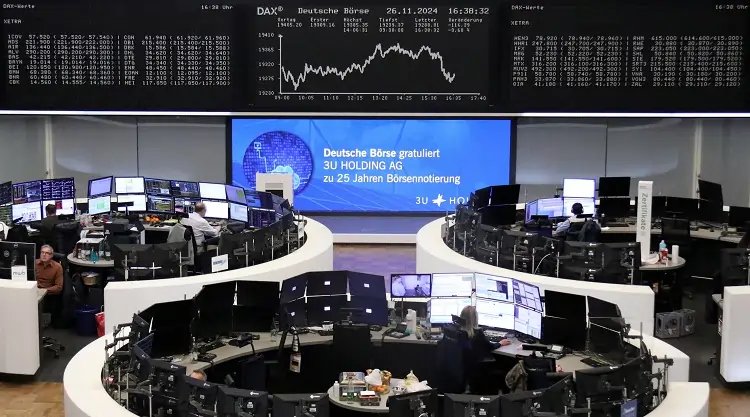Stocks pause, currencies mixed on Trump tariff concerns


By Medha Singh and Kevin Buckland
(Reuters) –Global stocks paused on Wednesday and currencies were mixed as investors worried over the next potential target for U.S. tariffs under President-elect Donald Trump, a day after he pledged new levies on Canada, Mexico and China.
The safe-haven Japanese yen extended its strong run, climbing to a three-week high on the U.S. dollar, which was in turn weighed down by sagging Treasury yields.
MSCI’s broadest index of Asia-Pacific shares recouped slight, early losses to edge 0.1% higher.
The pan-European STOXX 600 lost 0.4%, while the S&P 500 pointed to a slightly lower start. Earlier, Asian stocks lost their footing on Trump’s tariff pledges with equities in Japan, Taiwan and South Korea leading losses.
Stocks in China and Hong Kong rebounded from recent lows on bets that Beijing will roll out more supportive policies to counter risks of U.S. tariffs and shore up the sluggish Chinese economy. [.SS]
Trump said late on Monday that he would immediately put a 25% tariff on all products from Mexico and Canada upon taking office in January, and slap an additional 10% tariff on goods from China. The threat drew warnings of retaliation.
Trump also chose trade lawyer Jamieson Greer as his new U.S. trade representative, a key veteran of his first-term trade war against China. U.S. bond markets this week have taken heart to his pick for U.S. Treasury secretary over the weekend that spurred hopes of reining in government debt load.
“We’re trying to get our heads around very volatile communication where on the one hand you have very aggressive and uncompromising news on tariffs but on the other hand a pretty pragmatic pick for Treasury secretary,” said Samy Chaar, chief economist at Lombard Odier.
Trump’s policies are “relatively positive for U.S. business conditions but probably more challenging for the rest of the world that will have to adjust and find a path to avoid disruptions and more expensive access to U.S. markets.”
Canada’s loonie and Mexico’s peso hovered near their multi-year lows on Tuesday, while China’s yuan edged back towards the previous session’s four-month trough.
The U.S. dollar dropped against other major rivals, falling 0.2% to $1.0515 per euro and easing slightly to $1.26 against sterling. It slid almost 1% to 151.660 yen.
Investors seem to be taking some risk off the table as trading in November draws to close ahead of U.S. Thanksgiving holiday on Thursday, with many investors extending their break into Friday. Traders are also keeping an eye on a reading on a key inflation gauge, the PCE deflator, due later on Wednesday.
“We need to remember from (Trump’s) first term, these agenda are changeable depending on how the policy priorities change, and what he can get in terms of the negotiations with various countries,” said Keiko Kondo, head of multi-asset investments for Asia at Schroders, adding that based on the firm’s estimates, nearly 40% of Trump’s promises during his time in office were not delivered.
“We just need to sort of wait and see.”
The New Zealand dollar rebounded 0.9% to $0.5887 from multi-month lows after the country’s central bank opted to cut interest rates by 50 basis points on Wednesday, disappointing some in the market who had bet on a bigger reduction.
The largest cryptocurrency bitcoin attempted to find its feet after a four-day retreat from a record high of $99,830. It was last up 1.7% at $93,211.
Gold ticked up 0.3% to about $2,649 per ounce.
Oil prices stabilized as markets assessed the potential impact of a ceasefire deal between Israel and Hezbollah, ahead of Sunday’s OPEC+ meeting. [O/R]
Brent crude futures edged 0.1% lower to $72.72 a barrel, while U.S. West Texas Intermediate crude futures were up 0.1% at $68.84 a barrel.
(Reporting by Kevin Buckland; Additional reporting by Tom Westbrook; Editing by Christopher Cushing and Kim Coghill)
Foreign exchange, or forex, is the global marketplace for trading national currencies against one another. It is essential for international trade and investment.
Cryptocurrency is a digital or virtual form of currency that uses cryptography for security. It operates on decentralized networks based on blockchain technology.
Economic growth refers to the increase in the production of goods and services in an economy over a period of time, typically measured by GDP.
Investor sentiment is the overall attitude of investors toward a particular security or financial market. It can influence market trends and price movements.
Explore more articles in the Investing category











